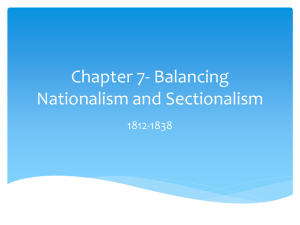Chapter 8 Notes
advertisement
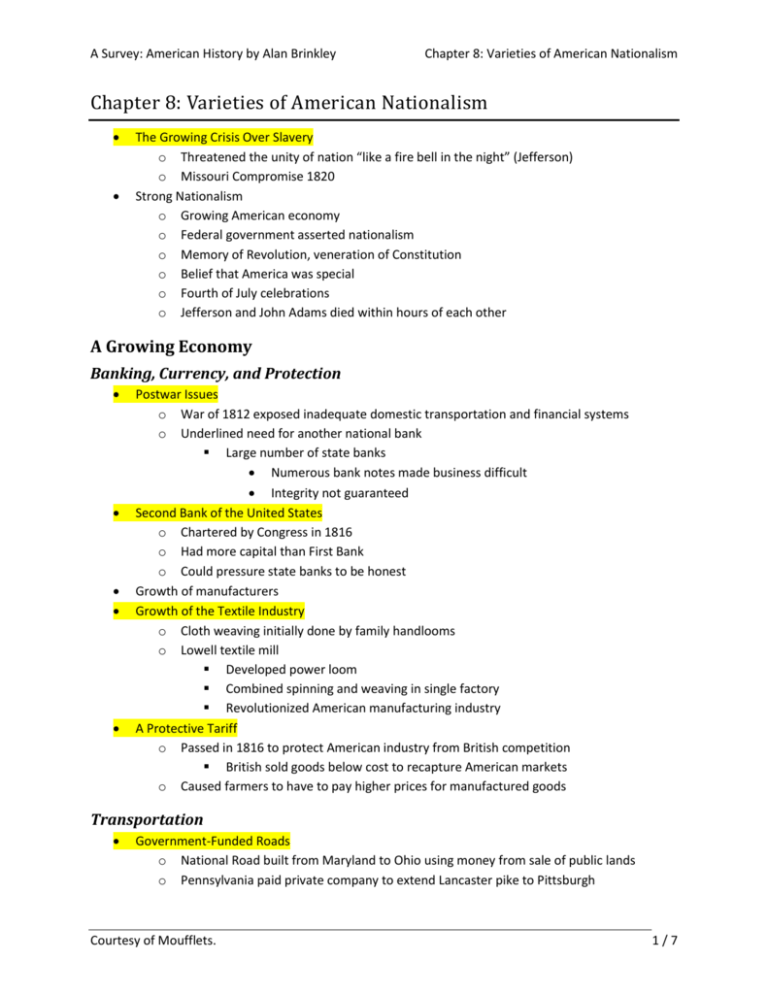
A Survey: American History by Alan Brinkley Chapter 8: Varieties of American Nationalism Chapter 8: Varieties of American Nationalism The Growing Crisis Over Slavery o Threatened the unity of nation “like a fire bell in the night” (Jefferson) o Missouri Compromise 1820 Strong Nationalism o Growing American economy o Federal government asserted nationalism o Memory of Revolution, veneration of Constitution o Belief that America was special o Fourth of July celebrations o Jefferson and John Adams died within hours of each other A Growing Economy Banking, Currency, and Protection Postwar Issues o War of 1812 exposed inadequate domestic transportation and financial systems o Underlined need for another national bank Large number of state banks Numerous bank notes made business difficult Integrity not guaranteed Second Bank of the United States o Chartered by Congress in 1816 o Had more capital than First Bank o Could pressure state banks to be honest Growth of manufacturers Growth of the Textile Industry o Cloth weaving initially done by family handlooms o Lowell textile mill Developed power loom Combined spinning and weaving in single factory Revolutionized American manufacturing industry A Protective Tariff o Passed in 1816 to protect American industry from British competition British sold goods below cost to recapture American markets o Caused farmers to have to pay higher prices for manufactured goods Transportation Government-Funded Roads o National Road built from Maryland to Ohio using money from sale of public lands o Pennsylvania paid private company to extend Lancaster pike to Pittsburgh Courtesy of Moufflets. 1/7 A Survey: American History by Alan Brinkley Chapter 8: Varieties of American Nationalism o Transportation costs across mountains lower than ever despite high tolls Steamboats o Steam-powered shipping began before war o Became most common form of transportation on Mississippi o Stimulated agricultural economy of the South Vetoing Internal Improvements o Madison wanted Constitutional amendment to establish transportation networks o Calhoun introduces internal improvements bill o Passed by Congress but vetoed by Madison because Congress did not have the authority w/out a Constitutional amendment Expanding Westward The Great Migrations Reasons for Westward Expansion o Overpopulation Agricultural lands in the east all taken up Spread of plantation system and slave labor limited new opportunities for new settlers o West becoming more attracted to settlers o The Factor System Government supplied goods to the tribes at cost Drove Canadian traders out and made natives easier to control The Plantation System in the Southwest Cotton growing o Old South losing fertility from erosion and overplanting o Farmers sought fresh land to grow cotton for ever increasing market Cotton and the Expansion of Slavery o Small farmers arrived to make small clearings o Wealthier planters bought off farms while original settlers moved west o Wealthy planters brought slaves with them Trading and Trapping in the Far West Mexican market o Mexico opened trade with United States after gaining independence o American merchants dominated trade, displaced Mexican and Indian traders o Mexico lost its markets in its own colony Astor’s American Fur Company o John Jacob Astor established Astoria at mouth of Columbia River in Oregon o Whites began competing with Indians as trappers o Rocky Mountain Fur Company The Fur Trade and the Market Economy Courtesy of Moufflets. 2/7 A Survey: American History by Alan Brinkley Chapter 8: Varieties of American Nationalism o Trappers dependent on market economy Bounded economically or logistically to merchants Most trappers coexisted with Indians o Jedediah S. Smith led forays into Mexican territories Eastern Images of the West Americans ignorant of actual condition of west Stephen Long’s Expedition o Stephen commissioned by War Department to search for source of Red River o Labeled Great Plains the “Great American” The “Era of Good Feelings” The End of the First Party System The Virginia Dynasty o Presidency since 1800 all Republicans from Virginia o James Monroe elected in 1816 Monroe entered favorable circumstances o No Federalist opposition o No international threats Included north/south, east/west, and Federalists/Republicans in his cabinet Monroe’s Goodwill Tour o Greeted everywhere with enthusiasm o “era of good feeling” had arrived John Quincy Adams and Florida John Quincy Adams believed in promotion of American expansion Wanted to annex entire Florida peninsula The Seminole War o Andrew Jackson to “adopt the necessary measures” to stop Indian raids o Used orders as excuse to invade Florida US had the right to defend itself Spain unwilling or unable to curb the threats Demonstrated that US could easily take Florida by force Adams-Onís Treaty of 1819 o Spanish minister Luis de Onís realized he had to come to terms o Spain cedes Florida to US, give up claim to land north of 42nd parallel o US to give up claims to Texas Panic of 1819 Followed period of high foreign demand for American farm goods Rising prices of farm goods stimulated a land boom Available credit fueled land boom Courtesy of Moufflets. 3/7 A Survey: American History by Alan Brinkley Chapter 8: Varieties of American Nationalism Boom and Bust o Banks began calling in loans, foreclosing mortcages o State bank failures, financial panic o Six years of depression o Warned of rapid growth and expansion would destabilize nation Sectionalism and Nationalism The Missouri Compromise Missouri applied for statehood o Already had slavery Tallmadge Amendment o Prohibit further introduction of slaves into Missour o Gradual emancipation New states had come in pairs, one from south and one from north o Missouri would upset balance Missouri Compromise o Southerners threatened to block the admission of Maine if northerners blocked admission of Missouri as slave state o Maine admitted as free state, Missouri admitted as slave state o Amendment banned slavery north of Missouri’s southern border Preserved Union for the moment Marshall and the Court John Marshall served from 1801 to 1835 Strengthened judicial branch and increased power of federal government Fletcher v. Peck (1810) o Defended inviolability of contracts o Contracts could not be repealed even if corruption was involved Dartmouth College v. Woodward (1819) o Corporation charters counted as contracts, inviolable o Restricted power of state governments to limit corporations Cohens v. Virginia (1821) o Affirmed constitutionality of federal review of state court decisions o State courts must submit to federal jurisdiction Confirming Implied Powers o McCulloch v. Maryland (1819) Upheld constitutionality of United States State attempted to drive Bank of the United States out of business through taxing and prohibition Government had constitutional right to charter Bank Power to tax involved “power to destroy” Courtesy of Moufflets. 4/7 A Survey: American History by Alan Brinkley Chapter 8: Varieties of American Nationalism Gibbons v. Ogden (1824) o Congress had power to regulate interstate commerce o State monopolies void Establishing Federal Primacy o Protected corporations and other private institutions from local governments o Highly nationalistic decisions to promote growth of strong, unified, and economically developed United States The Court and the Tribes Johnson v. McIntosh (1823) o Tribes had a basic right to their tribal lands that preceded all other American law o Individual American citizens could not buy or take land from tribes o Only federal government could obtain land from tribes Worcester v. Georgia (1832) o Only federal government could regulate access of US citizens to Cherokee country o Tribes were sovereign entities that had the right to remain free from the authority of state governments (like other states) Marshall decisions defined a place for Indian tribes within American political system o Tribes had basic property rights and not subject to authority of state governments o Federal government had ultimate authority over tribal affairs Limited to obligation to protect Indian welfare The Latin American Revolution and the Monroe Doctrine Revolution in Latin America o America had profitable trade with Latin America o US believed success of anti-Spanish revolutions would strength US’s position US declared neutrality in Spain’s war w/ its colonies o Actions revealed US were trying to help colonies o Sold ships and supplies to revolutionaries o Was the first nation to recognize the new countries The Monroe Doctrine o In 1823, Monroe declared that the Americas are no longer subject to colonization o American Fears Doctrine emerged out of fear that Spain’s European allies would attempt to retake its lost empire Adams feared that Britain wanted to take over Cuba o Established idea of America has dominant power in Western Hemisphere Courtesy of Moufflets. 5/7 A Survey: American History by Alan Brinkley Chapter 8: Varieties of American Nationalism The Revival of Opposition Federalists ceased to exist after 1816 Republican Party was the only organized force in national politics New Political Divisions o Mirrored schism that produce first party system o Republicans beginning to resemble Federalist regimes The “Corrupt Bargain” End of the Caucus System o Presidential candidates were nominated by caucuses of two parties o 1824, “King Caucus” overthrown Republicans nominated Crawford, Secretary of Treasury State legislatures and mass meetings elected other candidates John Quincy Adams, Secretary of State Henry Clay, Speaker of the House o “American System” o Called for great home market for factory and farm producers w/ high protective tariffs, strong national bank, and internal improvements Andrew Jackson, war hero o Election of 1824 Jackson had most popular electoral and popular votes No one had a majority 12th amendment called for House of Representatives to choose among top three candidates Clay supported Adams Adams won election in the House o Adams names Clay as Secretary of State Secretary of State seen as stepping stone to Presidency Jacksonians outraged The Second President Adams Adams pursued American System-like policy o Mostly blocked by Jacksonians Diplomatic frustrations o Sent delegate international Panama conference w/ Símon Bolívar o Southerners did not want white Americans mingling with black delegates from Haiti o Delegation delayed until it missed the conference Adams lost contest with State of Georgia Tariff of Abominations (1828) o New England wool makers complained of British underselling them Courtesy of Moufflets. 6/7 A Survey: American History by Alan Brinkley o o Chapter 8: Varieties of American Nationalism Administration had to accept duties on other items to win support from middle and western states Angered everyone, who had to pay higher prices for raw materials Jackson Triumphant Election of 1828 o National Republicans Supported John Quincy Adams Supported economic nationalism o Democratic Republicans Called for assault of privilege and widening of opportunity Jackson Triumphant o Champion of democracy would restore liberty to the people and the economy o “era of the common man” Courtesy of Moufflets. 7/7

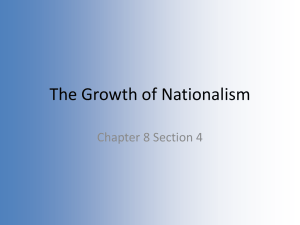
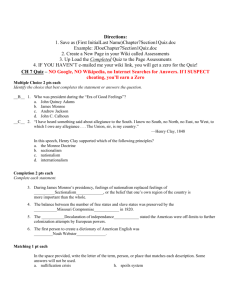
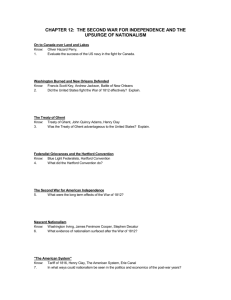
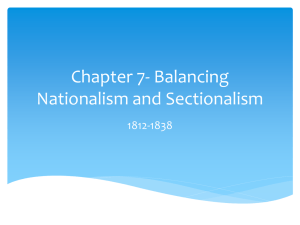
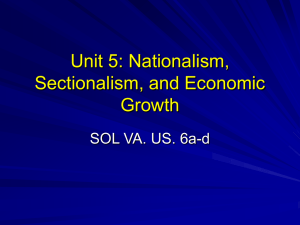
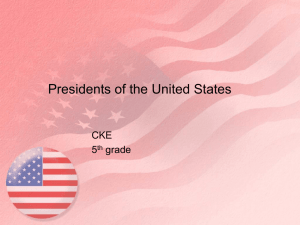

![“The Progress of invention is really a threat [to monarchy]. Whenever](http://s2.studylib.net/store/data/005328855_1-dcf2226918c1b7efad661cb19485529d-300x300.png)
